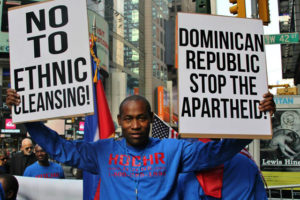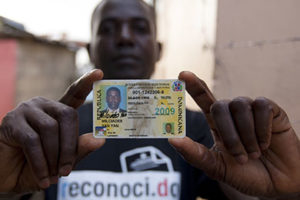[playwirevid id=’3675216′]
By Manny Otiko
The Dominican Republic and Haiti may share the island of Hispaniola, but they haven’t always been the best of neighbors. Their history includes invasions, wars, ethnic cleansing and, most recently, lynchings. A body of water separating the two countries is called “the Massacre River.” The Dominican Republic’s new law, forcing children of Haitian descent born in the country after 1929 to return to their ancestral home, is just the latest round in a series of clashes.
The island of Hispaniola was settled by European colonists in 1492 under the command of Christopher Columbus. Although the colony of Santo Domingo was founded by the Spanish, neighboring Haiti was ruled by the French, who named their colony Saint-Domingue. Santo Domingo gained independence from Spain in 1821, while the French colony was liberated by a slave revolt in 1803. However, in the early 19th century, Santo Domingo was occupied by Haitian leader Toussaint L’Ouverture, who stated he wanted to abolish slavery.
In 1822, Haitian President Jean-Pierre Boyer ordered a third invasion and unified the island. The 22-year occupation sowed the seeds of many of the tensions still present today. During the invasion, Haitian soldiers redistributed land and commandeered supplies. Even today, many Dominicans seem to resent Haitians for past grievances. They also feel pressured to deal with Haitian migrants who have fled their poverty-stricken homeland.
In 1937, Dominican strongman Rafael Trujillo targeted Haitians and dark-skinned Dominicans in the Parsley Massacre.

According to the International Business Times, the Parsley Massacre, which killed about 200,000 Haitians, had a racial aspect to it.
“The killings also had a decided racial angle, hence the term ‘genocide’ favored by some scholars who studied the massacre,” said International Business Times writer Palash Ghosh. “Dominicans, like many Latin American societies, were ruled by a white Spanish elite who lorded over a population principally comprised of mixed-race mulattoes or those who were of mixed European-Amerindian blood. Haitians, in contrast, were overwhelmingly of unmixed black African heritage.”
Ironically, the American-trained Trujillo, who ordered the massacre, was biracial.
The situation has not improved much today with the Dominican government saying it plans to round up Haitians, or anyone who looks dark skinned, and repatriate them, unless they can provide the right paperwork. According to The Washington Post, the government has hired 150 workers and called up 2,000 military personnel to organize the mass deportation process, which could affect about 250,000 people.
More disturbingly, the Dominican government has stated its policy is necessary to “cleanse” voter registration lists and reduce fraud.
However, critics of the government policy say the law is a convenient way of legalizing discrimination against Haitians. The Dominican Republic has a major problem with discrimination against Haitians, who have crossed the border for years to work in the sugar cane fields and find employment as cleaners and nannies.
The Dominican government policy is set to create a humanitarian crisis as thousands of native Dominicans may be forced to return to a foreign country.

Critics have also said removing thousands of workers might have a negative effect on the economy.
“Others have raised questions about the impact on the Dominican economy. For generations, Haitians have assumed the jobs that many Dominicans do not want, filling a vital part of the labor market, often at below-market rates. Production costs could rise, some experts say, if a large chunk of the labor force is removed,” according to The New York Times.

